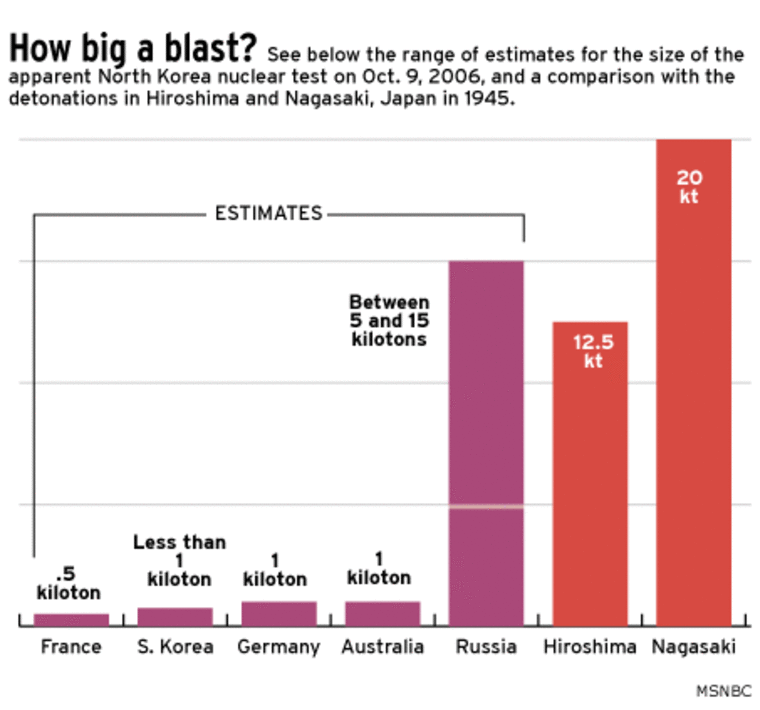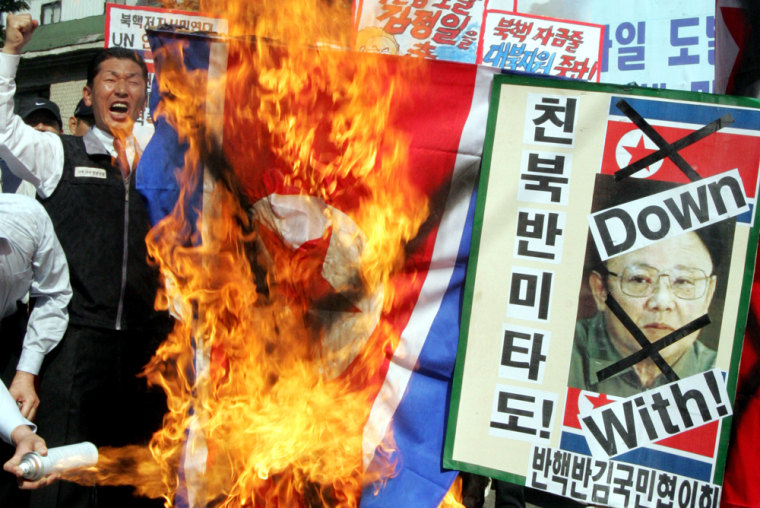A jittery world lashed out at North Korea with fresh threats of harsh sanctions Tuesday, a day after the isolated regime defied U.N. warnings and test-detonated what it said was its first nuclear bomb.
A defiant North Korea meanwhile, stoked tensions by threatening more tests or the firing of a nuclear tipped missile if the United States does not engage in direct talks.
South Korea's Yonhap news agency reported out of Beijing on Tuesday that the North Korean official scoffed at sanctions and demanded concessions from Washington.
"We hope the situation will be resolved before an unfortunate incident of us firing a nuclear missile comes," the unnamed official said a day earlier, according to Yonhap. "That depends on how the U.S. will act."
"The nuclear test is an expression of our intention to face the United States across the negotiating table," the official said.
"What we want is security of the (North), including guaranteeing our system."
Neighbors condemn action
Earlier Tuesday, Australia said it would impose a range of measures on North Korea, including curtailing visas and supporting any U.N. sanctions, while Japan said it was weighing stricter economic sanctions against its isolated, impoverished neighbor.
South Korea condemned the attacks, but said it would take a couple of weeks to confirm whether the nuclear test was actually successful, as claimed by the North.
Even North Korea's erstwhile ally China joined the chorus, with Foreign Ministry spokesman Liu Jianchao saying the test would hurt ties.
"The nuclear test will undoubtedly exert a negative impact on our relations," Liu said.
China had earlier signaled to visiting South Korean envoy that Beijing appears ready to drop opposition to tough U.N. sanctions. But China said it would oppose military force.
"We do not endorse any military action toward North Korea. We are firmly against that," Liu said. "Taking military action against North Korea would be unimaginable."
"China seems to have different position than it had before on a Chapter 7 resolution," Chun Young-woo told The Associated Press, referring to the section of the U.N. Charter that deals with threats to international peace.
To deal with these threats or conflicts, the U.N. Security Council can authorize a range of measures under Chapter 7, from breaking diplomatic ties and imposing economic and military sanctions to taking military action to restore peace.
Crippling sanctions for North Korea?
The swirl of diplomatic alarm comes as the U.N. Security Council began weighing a U.S. draft resolution to impose potentially crippling sanctions on North Korea.
Hours after the North Korean test, the Security Council unanimously condemned the move and urged Pyongyang to refrain from further nuclear blasts, return to six-party talks and keep its pledge to scrap its clandestine weapons program.
President Bush called the North Korean announcement provocative and unacceptable, though he said Washington is still trying to confirm the test.
Nonetheless, Pyongyang's actions "constitutes a threat to international peace and security" and requires "an immediate response" from the Security Council, he said.
Australian Foreign Minister Alexander Downer said Tuesday his country will go ahead with its own sanctions, but stopped short of severing Canberra's limited diplomatic relations with the North, which are viewed as an important conduit to the outside world.
Australia, a close ally of the United States, and the North resumed diplomatic relations in 2000 after Pyongyang agreed to international negotiations over its nuclear ambitions.
"We were urging our friends and allies in the United Nations to pass a resolution imposing sanctions," Downer said.

Japan, a key player in six-nation international talks aimed at dismantling the North's nuclear program, echoed Australia's call for sanctions.
"We will discuss sanctions at the U.N. Security Council," Chief Cabinet Secretary Yasuhisa Shiozaki said. "We are considering all possibilities. What kind of resolution it will be will be based on the results of the discussion at the Security Council."
Japanese Finance Minister Koji Omi, meanwhile, said Tokyo will consider expanding its already constricting financial sanctions against the North.
Japan imposed limited sanctions in July -- including barring a North Korean trade ferry from Japanese ports -- after North Korea conducted missile tests in July, then imposed more financial sanctions in September.
South Korean officials meanwhile said they believed North Korea tested a nuclear weapon as claimed, but presidential security adviser Song Min-soon said it would take about two weeks to determine if it had been successful.
Seoul believes North Korea is trying to use a test as a bargaining chip with the U.S. to win concessions, Unification Minister Lee Jong-seok said.
China, Japan, Russia, South Korea and the United States have held intermittent talks with North Korea since 2003 in hopes of getting Pyongyang to abandon nuclear weapons in exchange for aid and security guarantees.
A Security Council resolution adopted in July after a series of North Korean missile launches imposed limited sanctions on North Korea and demanded that the country rejoin international nuclear talks.
Pyongyang rejected the plea.
